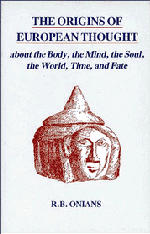Book contents
- Frontmatter
- Contents
- Preface to the first edition
- Preface to the second edition
- Introduction: The Earliest Greeks
- PART I THE MIND AND THE BODY
- PART II THE IMMORTAL SOUL AND THE BODY
- PART III FATE AND TIME
- Chapter I ‘On the Knees of the Gods’
- Chapter II Πείρατα
- Chapter III Καιρός
- Chapter IV The Weaving of Fate
- Chapter V Other Peoples—Fate and Magic
- Chapter VI Μοῖραν ἐπιτιθέναι, πεπρωμένος, etc.
- Chapter VII ʿΥπὲρ μόρον and the Relation of the Gods of Fate
- Chapter VIII The Jars of Zeus, the Scates of Zeus, and the Κῆρες
- Chapter IX Time—Ἦμαρ
- Chapter X Lachesis, Klotho, and Atropos
- Chapter XI Phases of Body and Mind, Sorrow, Sleep, Death, etc.
- Chapter XII Τέλος
- ADDENDA
- Indexes
- Frontmatter
- Contents
- Preface to the first edition
- Preface to the second edition
- Introduction: The Earliest Greeks
- PART I THE MIND AND THE BODY
- PART II THE IMMORTAL SOUL AND THE BODY
- PART III FATE AND TIME
- Chapter I ‘On the Knees of the Gods’
- Chapter II Πείρατα
- Chapter III Καιρός
- Chapter IV The Weaving of Fate
- Chapter V Other Peoples—Fate and Magic
- Chapter VI Μοῖραν ἐπιτιθέναι, πεπρωμένος, etc.
- Chapter VII ʿΥπὲρ μόρον and the Relation of the Gods of Fate
- Chapter VIII The Jars of Zeus, the Scates of Zeus, and the Κῆρες
- Chapter IX Time—Ἦμαρ
- Chapter X Lachesis, Klotho, and Atropos
- Chapter XI Phases of Body and Mind, Sorrow, Sleep, Death, etc.
- Chapter XII Τέλος
- ADDENDA
- Indexes
Summary
In modern European thought there has prevailed the conception of time as a homogeneous medium analogous to empty space. Bergson and Einstein have from different angles helped to dethrone that concept. For the Homeric Greeks time was not homogeneous; it had quality; it differed at large for the whole world within the horizon. There are all the changes of the day from dawn to the end of night, all the changes of the year from the beginning of spring on through summer, autumn, and winter. For the Romans time was weather, weather time, tempos, tempestas; and the thought survives in the modern French idiom: il fait mauvais temps, etc. Whatever came man could neither bring nor avert. Neither chaotic nor mechanically regular, it appeared to be the work of other minds, and above all of the power in the sky, Zeus. The day changes in intelligible order but with ceaseless variation of detail, so too the year. And it is not merely the sky above—blue aether, sun, moon, and stars—which changes, but the wind blowing from this quarter or that, soft or strong or not at all, maybe clouds, thunder and lightning, rain, hail or snow, the earth becoming light or dark, moist or dry, hot or cold, the waters changing, too, and all things that live—plants springing from the seed and growing to flower and seed again, animals mating and giving birth and growing up and growing old, all in due season, becoming active with the spring or hibernating, opening or wakening with the dawn, falling asleep or closing with the night.
- Type
- Chapter
- Information
- The Origins of European ThoughtAbout the Body, the Mind, the Soul, the World, Time and Fate, pp. 411 - 415Publisher: Cambridge University PressPrint publication year: 1988

